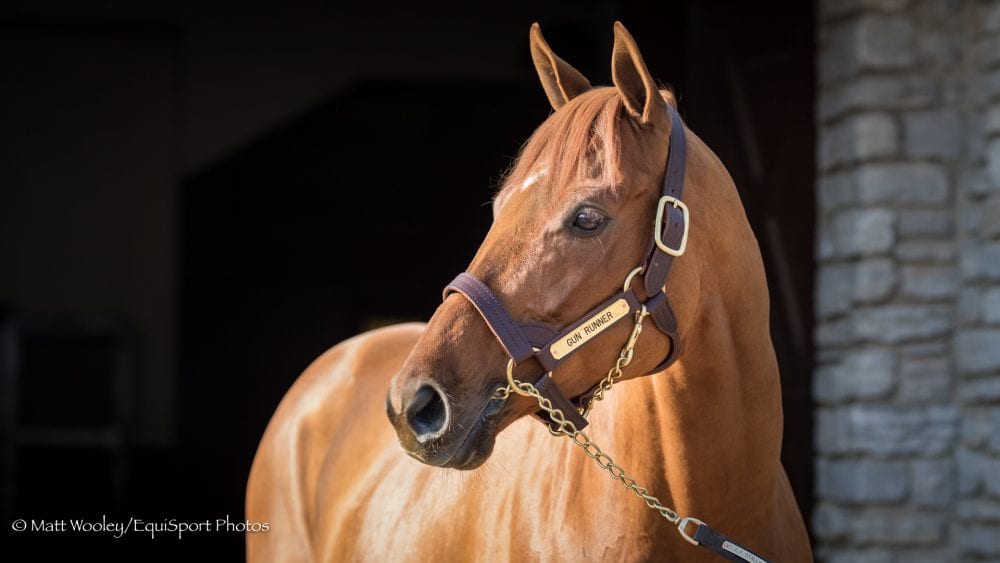The following appeared in The Paulick Report February 5 and was written by Joe Nevills.
The developing situation regarding the status of historical horse racing (HHR) in Kentucky has created an “all hands on deck” scenario within the state’s racing industry to ensure the crucial revenue source remains in place.
That call has been heard outside the state as well. The Virginia Thoroughbred Association will feature a group of offerings during its upcoming stallion season auction where the full proceeds will benefit the Kentucky Equine Education Project’s lobbying efforts toward restoring HHR in the state and putting it on firmer legal ground.
The auction, set to take place Wednesday, Feb. 10, features four seasons donated thus far by Kentucky stallion operations where the money will go toward the KEEP Alliance, a branch of KEEP specifically dedicated to lobbying, grassroots campaigns, and otherwise raising awareness among key people and groups about the importance of HHR in Kentucky.
As of Friday morning, the seasons benefitting the KEEP Alliance come from Airdrie Stud‘s Complexity, Spendthrift Farm‘s Goldencents, Gun Runner of Three Chimneys, and Not This Time of Taylor Made Stallions. Farms are welcome to donate further seasons to benefit the KEEP Alliance prior to the auction.
VTA executive director Debbie Easter said the seasons were added to the auction in recent weeks, helping push the total number of different stallions on offer near 220 from 11 different states.
“Obviously, it’s a good cause,” Easter said. “Everybody gets too regionalized sometimes, and it’s important for us to work together to help each other. This is an important thing for Kentucky, and helping keeping things going along is important. Horse people working together always do better than working apart, so we’re trying to move the needle a little bit.”
Virginia’s Thoroughbred economy is familiar with the benefits HHR can have on a program.
Gov. Ralph Northam signed an HHR bill into law in 2018, which set into motion the re-opening of Colonial Downs and significant funding sources to fuel purses and incentive programs on and off the racetrack. The Virginia-Certified program paid out a record $1.77 million in awards in 2020, and Easter said HHR revenues have just started to kick into that pool, leaving even more room for growth in the future.
“We certainly know how important HHR is going to be to us,” Easter said, “and we’ve certainly seen what it’s done for Kentucky, and they can’t afford to lose that.”
While Virginia has been able to show positive growth with the help of HHR, it’s widely accepted that Kentucky’s Thoroughbred market is the tide that lifts and sinks the other regional-market boats in North America.
Even the largest foal-producing jurisdictions outside of the Bluegrass State are supported heavily by Kentucky stallions, and its starting gates are filled by Kentucky-breds. A weakened Kentucky racing industry would have ripple effects on the state’s breeding program, and the rest of North America would feel the aftershock whether they race or breed in the state or not.
“Debbie was very enthusiastic about helping us,” said Elizabeth Jensen, KEEP’s executive vice president. “I think everybody realizes as goes Kentucky, so goes the rest of the country’s racing industry, so we need to keep it strong and vibrant here. We’re happy that our counterparts in Virginia are willing to help us out and support us.”
Beyond the season donations, Jensen said Kentucky’s major stallion operations have supportive of the advocacy measures to preserve HHR in the state. She noted that farms including Ashford Stud and WinStar Farm have made cash donations, and many stallion stations have sent out emails to their client lists urging them to take action.
“Preserving historical horse racing has to be the entire industry in Kentucky’s priority right now,” Jensen said. “If we lose that, we lose 1,400 jobs overnight, and losing those purses and the horses that we’re getting at Ellis Park and Kentucky Downs during summer racing, and just the whole racing circuit in Kentucky will be severely impacted if we don’t get this done.”


